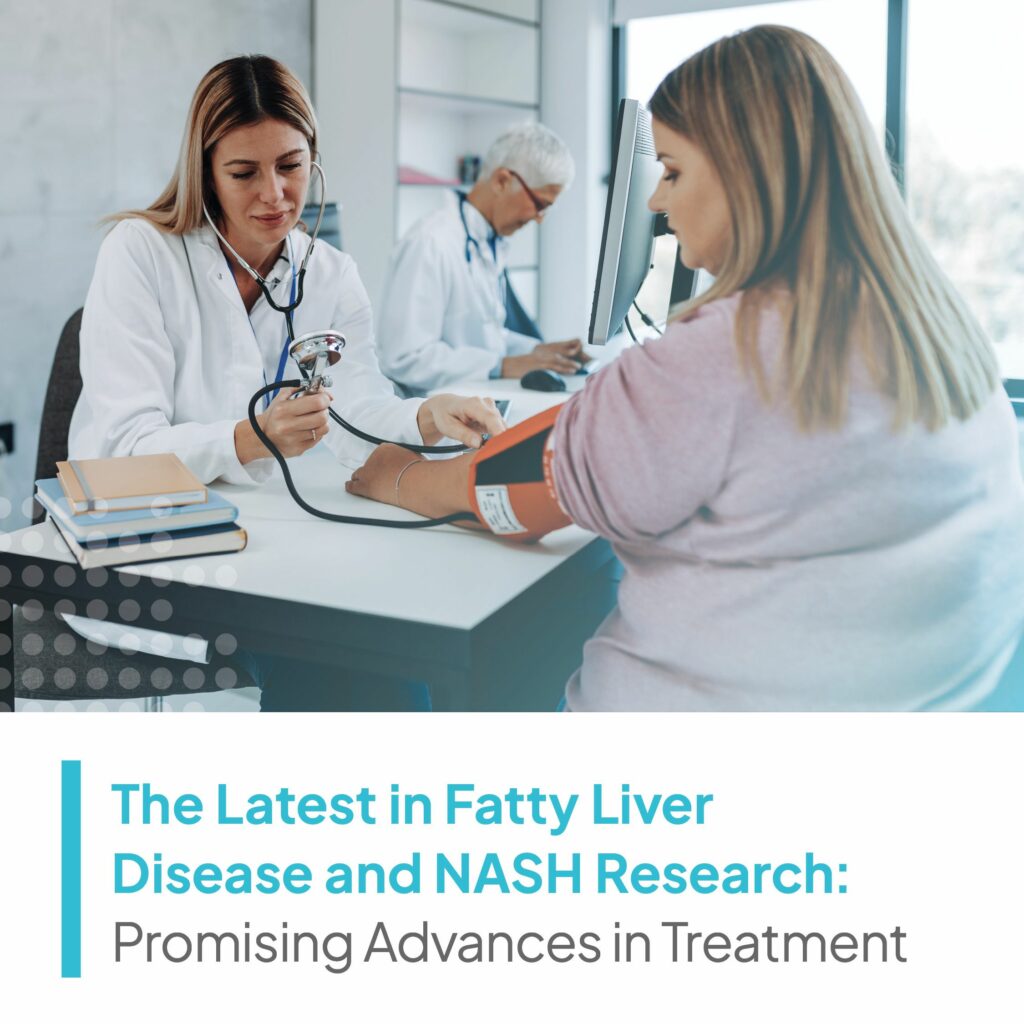What are MASH and Steatotic Liver Disease?
Steatotic liver disease (formerly known as fatty liver disease) is a condition characterized by the accumulation of fat in the liver. It can be caused by excessive alcohol consumption (MetALD) or by factors unrelated to alcohol (metabolic dysfunction-associated steatotic liver disease or MASLD). MASLD (formerly called nonalcoholic fatty liver disease or NAFLD) encompasses a range of conditions, with the most severe form known as metabolic dysfunction-associated steatohepatitis (MASH). MASH (formerly known as nonalcoholic steatohepatitis or NASH) is a progressive liver disease that can lead to liver fibrosis, cirrhosis, and even liver cancer.
Steatotic liver disease and MASH have become increasingly prevalent worldwide, with estimates suggesting that approximately 25% of the global population is affected by MASLD. The rise in obesity rates, sedentary lifestyles, and unhealthy dietary habits are contributing factors to this alarming trend.
The underlying mechanisms of MASH are complex and not yet fully understood. However, it is believed that insulin resistance, oxidative stress, inflammation, and genetic predisposition play significant roles in its development.
Symptoms and Effects of Chronic Liver Disease
Chronic liver disease encompasses a spectrum of conditions that progressively damage the liver, impairing its ability to perform vital functions essential for life. Among these conditions, liver cirrhosis and its associated complications, such as ascites and hepatic encephalopathy (HE), stand out for their significant impact on patients’ health and quality of life.
What is Liver Cirrhosis?
Cirrhosis of the liver is the result of too much scarring (called fibrosis) in the liver. The scarring occurs because of liver diseases and conditions, including chronic alcohol use and hepatitis. The liver is able to repair itself when damaged, however, if the liver is constantly working to repair itself, permanent scar tissue will form over time. This tissue keeps the liver from working properly, causing blocks in blood flow and the liver’s ability to process. Being diagnosed with cirrhosis doesn’t imply immediate fatality. However, as the disease progresses, more scar tissue forms, causing decreased liver function. It also can cause other conditions, such as hepatic encephalopathy, which affects brain function due to the liver’s inability to remove toxins from the blood.
What is Ascites?
Ascites is a medical term used to refer to the free abdominal fluid that can accumulate in the belly of cirrhotic individuals. This fluid buildup in the abdomen usually results from increased pressure across the blood vessels that travel across the diseased liver. It’s commonly recognized by a person’s tense and distended abdomen. It can accompany other symptoms, such as abdominal discomfort, pain, difficulty breathing, and fatigue.
Approximately 70% of liver cirrhosis patients end up developing ascites. It happens as a result of lowered production of albumin, a protein made by the liver that helps keep fluid from leaking out of your blood vessels into other tissues, and carries hormones, vitamins, and enzymes throughout your body. In cirrhosis, scarring and inflammation damage the cells required to produce albumin, leading to a buildup of free abdominal fluid. This free abdominal fluid, known as ascites, can be incredibly uncomfortable for patients with liver cirrhosis. Abdominal fluid can prove dangerous if left untreated, resulting in complications such as infection.
Early detection can be vital to improving the quality of life for those afflicted with ascites. If you or someone you know has cirrhosis and begins to exhibit abdominal distension and rapid weight gain, it’s important to get checked by a physician as soon as possible.
What is Hepatic Encephalopathy?
Your liver performs over 500 important functions for your body. One of its most important roles is to clean your blood. When the liver doesn’t work properly, toxins begin to build up in your bloodstream. Once they travel to the brain, these toxins cause trouble for your nervous system and brain function. The resulting disorder is called Hepatic Encephalopathy or HE.
HE often occurs in people who have a chronic liver disease such as cirrhosis. It can be mild or severe and, if treated, can be reversible. It has a wide array of symptoms that affects your brain, speech, nerves, personality, coordination, and more. Up to 70% of those with liver cirrhosis develop symptoms of HE, so prevention is important in order to avoid developing this disorder and the resulting damage.
Current Treatments for Steatotic Liver Disease and MASH
Currently, there is no approved medication specifically for the treatment of MASH. The standard recommendations for managing steatotic liver disease and MASH involve lifestyle modifications. These include weight loss through a healthy diet and regular exercise, as well as the management of associated conditions such as diabetes, high blood pressure, and high cholesterol.
Research efforts have been focused on developing pharmacological treatments to target the underlying mechanisms of MASH and reduce liver fat accumulation, inflammation, and fibrosis. Several clinical trials are underway to evaluate the safety and efficacy of various investigational drugs.
Advancements in MASH Research
The field of MASH research has seen exciting developments in recent years. Several potential therapeutic targets and drug candidates are being explored to address the unmet medical need for effective MASH treatments.
One promising approach involves targeting the pathways involved in liver fat metabolism, inflammation, and fibrosis. Some investigational drugs aim to improve insulin sensitivity, reduce liver fat accumulation, and prevent liver cell damage. These medications have shown promising results in early clinical trials, and further studies are ongoing to assess their long-term safety and efficacy.
Another area of focus is the development of antifibrotic therapies that can halt or reverse liver fibrosis, a critical determinant of MASH progression. These treatments aim to inhibit the activation of hepatic stellate cells, which are responsible for excessive collagen deposition in the liver. By targeting fibrotic processes, researchers hope to prevent the development of advanced liver disease and its associated complications.
Clinical Trials for MASH
Velocity Clinical Research is actively involved in conducting clinical trials for investigational medications aimed at treating MASH. These trials aim to evaluate the safety and effectiveness of potential medications for steatotic liver disease and MASH.
Participating in a clinical trial can provide individuals with access to cutting-edge therapies and contribute to the advancement of MASH research. If you’re interested in learning more about ongoing clinical trials for MASH and MASLD at Velocity, fill out this form and speak with a recruitment specialist.
The future of MASH treatment holds promise, and ongoing research endeavors are dedicated to finding effective therapies to combat this increasingly prevalent liver disease.
Further Reading
- National Institute of Diabetes and Digestive and Kidney Diseases (NIDDK). Nonalcoholic Fatty Liver Disease & NASH: https://www.niddk.nih.gov/health-information/liver-disease/nafld-nash
- American Liver Foundation. Non-Alcoholic Fatty Liver Disease: https://liverfoundation.org/for-patients/about-the-liver/diseases-of-the-liver/non-alcoholic-fatty-liver-disease/
Note
All instances of “NASH,” “fatty liver disease,” and “NAFLD” have been updated to “MASH,” “steatotic liver disease,” and “MASLD” respectively since the original publishing of this piece due to nomenclature updates.

